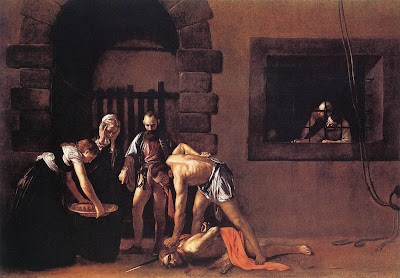 |
CARAVAGGIO. Narcissus. 1598-99.
Oil on canvas. Galleria Nazionale d'Arte Antica, Rome. |
Welcome back,
discipuli. It is hard to return to school. Shakespeare compares it to leaving a loved one, "
Love goes toward love as schoolboys from their books,. But love from love, toward school with heavy looks." So why do must we do it? Consider this meditation, and consider the painting.
Here we have Narcissus who, as Ovid tells us, after hunting, "stooped to quench his thirst another thirst increased. While he is drinking he beholds himself reflected in the mirrored pool—and loves; loves an imagined body which contains no substance, for he deems the mirrored shade a thing of life to love. He cannot move, for so he marvels at himself, and lies with countenance unchanged, as if indeed a statue carved of Parian marble." Trying to relate to the image, he died there. Tiresias, the prophet, explains for us the moral lesson: "If he but fail to recognize himself, a long life he may have, beneath the sun." Thus, it is that the purpose of education must also draw you out of your own narcissism, which daily surrounds you and presses in on you from every side. Facebook, Tumbler, video games, personal blogs, Instagram, Google+, and all other forms of entertainment often draw us away from THE OTHER.
Schola should therefore should promote love of Other Things, particularly good, true, and beautiful things. God has created a giant universe full of new and beautiful things, and He has created us to be full of wonder. He has not created us to wither our lives away as Narcissus did, enamored with oneself yet starving physically and intellectually.
Agenda:
- Welcome back, discipuli. Pray.
- Meet, greet, and seat:
- Who are you?
- Why do you exist?
- What was the craziest or coolest thing you did this summer?
- Lecture: Quid schola est?
- Review and discuss Humanities VIII Syllabus:
- Course Description: philosophy and literature in the American Authors
- Course Outline: Puritans to the Moderns
- Grading: unjust weights are an abomination to the Lord.
- Class Policies: follow the handbook, and it will go well with you in the land.
- Review HW:
- Sign Syllabus and turn in by Friday.
- HVM VIII Binder











.jpg)



